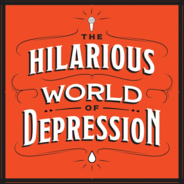
Gesundheit, Wellness & Beauty
The Hilarious World of Depression Folgen
A show about clinical depression...with laughs? Well, yeah. Depression is an incredibly common and isolating disease experienced by millions, yet often stigmatized by society. The Hilarious World of Depression is a series of frank, moving, and, yes, funny conversations with top comedians who have dealt with this disease, hosted by veteran humorist and public radio host John Moe. Join guests such as Maria Bamford, Paul F. Tompkins, Andy Richter, and Jen Kirkman to learn how they’ve dealt with depression and managed to laugh along the way. If you have not met the disease personally, it’s almost certain that someone you know has, whether it’s a friend, family member, colleague, or neighbor. Depression is a vicious cycle of solitude and stigma that leaves people miserable and sometimes dead. Frankly, we’re not going to put up with that anymore. The Hilarious World of Depression is not medical treatment and should not be seen as a substitute for therapy or medication. But it is a chance to gain some insight, have a few laughs, and realize that people with depression are not alone and that together, we can all feel a bit better. American Public Media and HealthPartners’ Make It Okay campaign are committed to breaking the stigma around mental health.
Folgen von The Hilarious World of Depression
-
Folge vom 02.01.2017Episode #4: Dick Cavett Tells Tales of Hollywood’s Secret ShameJust about everyone who mattered in the '60s and '70s hung out with Dick Cavett. His talk shows were hilarious, candid, and culturally vital. They were snarky before David Letterman ever hit the air, and sharp before Jon Stewart showed up on anyone’s TV. Along the way, he managed to infuriate Richard Nixon such that the President plotted attacks against him, which is when you know you’ve really arrived. On this episode, Dick talks about his own struggles with depression as well as the struggles of people he knew, including Judy Garland, Laurence Olivier, Marlon Brando, and Groucho Marx.
-
Folge vom 26.12.2016Episode #3: Sam Grittner Finds a Funny Thing Happened On the Way to SuicideIt was an otherwise ordinary May morning when Sam decided it was the right time to die. In some ways it was a surprising decision. He had managed to kick most of the substance abuse problems that he had wrestled with for years. Oxy, ecstasy, crack, heroin, and booze were no longer part of his life. Depression was still there, though, and so was a lot of frustration about his comedy career and personal life. So he went for it and swallowed more pills than he would ever need to kill himself. Then something else happened.
-
Folge vom 19.12.2016Episode #2: Maria Bamford Talks Bipolar II While Her Pugs Eat Nilla WafersFor some people, treating depression is a matter of going to a doctor or therapist, maybe getting some meds, and then feeling better. For comedian and actress Maria Bamford, the path to doing better was way longer and more complicated. She shares her experiences with depression, OCD, hypomania, and persistent, unwanted disturbing thoughts, as well as bad therapy, ineffective in-patient treatment, and breakdowns. A diagnosis of Bipolar II, which covered a lot of what was wrong with her, and some Googling helped put her on track to become the healthier person she is today.
-
Folge vom 12.12.2016Episode #1: Peter Sagal Opens UpThe longtime host of NPR’s Wait Wait…Don’t Tell Me has battled depression for much of his life but has never gone public with that struggle until now. Sagal recently went through what was for him a very painful and very messy divorce. He shares how he’s been able to move on and host a weekly comedy program even as his life was falling apart. Some of the methods: keeping very busy and listening to Amy Poehler. We also hear from Peter Sagal’s friend, the neuroscientist Daniel Levitin, on what helps and hurts a depressed person’s brain in times of crisis.
